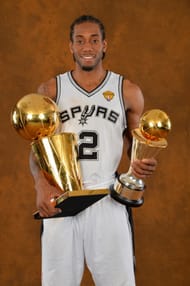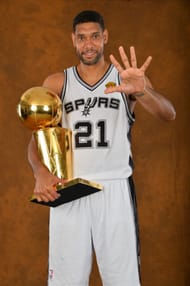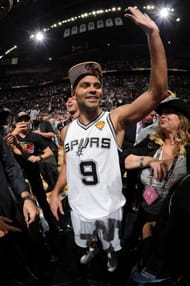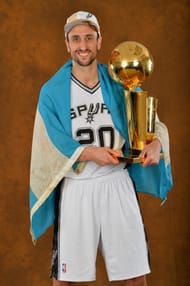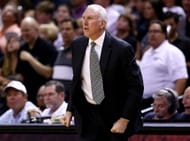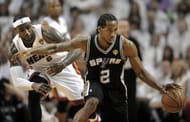The respect and awe for the world’s best basketball players has continued for me as a fan even in adulthood, but when I was younger, the ‘awe’ I felt at watching the NBA’s best on TV always made a strong impression in my mind. All young basketball fans feel that way. We watch a star player do unbelievable and amazing things, and the next chance we step out on court, we try to emulate them. We grew up trying to shoot like Kobe or Dirk. Make a flashy pass like Nash or Jason Williams. Practice dunking on a lowered rim like Vince Carter. Crossover like Iverson. Attack the basket like LeBron. And stick out our tongues after a clutch game-winner like Jordan.
The more success a player had, the more his cult status grew, especially among the young generation that grow up watching him. And years, or even decades later, those impressions continue to shape the mentality and style of a fan, on and off the court.
But this year, the script has been flipped a little.
Explore the NBA Draft 2024 with our free NBA Mock Draft Simulator & be the GM of your favorite NBA team.
As basketball fans around the world saw the San Antonio Spurs complete a dominant season with a crushing victory over the Miami Heat, they impressed in more ways than anyone could’ve imagined. Rarely in this memorable championship run was there an individual with a spectacularly memorable skill-set. Instead, a whole generation of young NBA fans watching the Spurs would’ve learnt that basketball success has to do with much more than a transcendent superstar. Watching the Spurs make the extra pass, create multiple screens for each other, box out so their teammate can win the rebounds, switch expertly on defense, and continuously keep the ball moving has brought a selfless brand of basketball back into our collective consciousness. And throughout, the Spurs remained an exciting, awe-inspiring, and eventually, successful team.
As youngsters, we used to think that those taking the final shot, those making the spectacular plays, are the heroes of basketball. Watching the Spurs win this season will make a lot of people realize that basketball heroes are the ones who play unselfishly, who work hard, who complete their assignments, and who play the game the right away, putting the team before self.
As the last minutes of Game 5 ticked by and San Antonio prepared to celebrate their title, the question arose in everyone’s mind: who would be named the Finals MVP? For the Spurs, there was no easy answer, because unlike other teams, they didn’t have any one individual that proved to be the difference-maker. Instead, they were all a collective force of MVPs.
The Heat had one and only one MVP candidate: LeBron James, who worked alone in shouldering his team’s load, averaging 28.2 points on 57 percent shooting and 7.8 rebounds through the course of the series. The Spurs, meanwhile, didn’t need any one player to be their superstar. Between eventual Finals MVP Kawhi Leonard, Tony Parker, Tim Duncan, Danny Green, Boris Diaw, Manu Ginobili, and Patty Mills, they got close to equal contributions from all their crucial cogs. Any troubles to LeBron (cramps in Game 1, or a cold-shooting stretch) would completely derail the Heat. But the Spurs could survive any individual troubles because there were enough weapons to step up if one of those weapons started misfiring.
Considering that the Spurs had been the best team in the NBA all season, had gotten through a tougher Western Conference where they defeated the Mavericks, Trail Blazers, and Thunder, it wasn’t all that surprising that they trumped the Heat in the Finals. But the shock was in how easy they made it look. A year ago, the same matchup stretched to seven intensely close games. This year, the Spurs wrapped up the series in just five. All their four wins were blowouts by an average margin of 18 points per game. Their only loss came by two, on a night that LeBron single-handedly produced one of the most special games of this year’s playoffs.
The entire post-season had been a blowout party for the Spurs. The title-clinching Game 5 was their 12th win in the playoffs by 15 or more points, the most by any team ever in a post-season. The Spurs outscored opponents by 214 points in the playoffs. They weren’t just winning games, they were completely decimating opponents in style. And yet, no one in the team averaged over 18 points per game throughout the playoff run.
In the Finals, the Spurs moved into a special zone, made extra special considering that they were going against the Miami Heat, one of the strongest teams in recent years. Heat were making their fourth consecutive Finals appearance after winning the last two NBA Championships. They had the NBA’s reigning two-time Finals MVP who also happened to be one of the greatest basketball players of our time. They had two other All Stars, a wonderful coach, and a championship winning mentality that had helped them win their last 11 consecutive playoff series.
And yet, the Spurs brushed the Heat aside like a lowly First Round opponent. The final point-differential in the Finals of 70 is the largest in NBA history. They assisted on 66.5 percent of their baskets in the Finals. They made history by shooting at near 76 percent in the first half of Game 3. And they turned one of the NBA’s best defenses invisible with their efficient scoring, while also negating Miami’s offense on the way. It was a basketball clinic, and Gregg Popovich’s squad were taking not only the Heat, but every other NBA teams watching to hoops school.
This was the Spurs’ fifth franchise title, all of which have come in the last 16 seasons with the partnership of Popovich and Tim Duncan. It was their first title since 2007, and probably the sweetest ever.
Popovich continued to rise up the ranks of one of greatest coaches in NBA history and capped off a Coach of the Year season with his fifth title. He had repeatedly called last year’s Finals loss “devastating”; this year, he made sure his team would forget the 2013 tragedy.
Duncan – a living, breathing, dunking, post-dominating legend – also claimed his fifth title, and became the first player to start for three different championship winning teams over three decades. Back in 1999, Duncan had been the Finals MVP. In 2014, at age 38, he continued tirelessly, averaging 15.4 points and 10 rebounds in the Finals. In the process, he became the NBA’s All Time leader in playoffs minutes and double-doubles.
The Spurs’ leading scorer (by a small margin) was Tony Parker, the talented point guard who captured his fourth NBA title. Parker was hobbled by an ankle injury, and despite scoring 18 points per game, he never actually played at an expected superstar level, and even started Game 5 shooting 0-10 before rediscovering his mojo. It’s another compliment to this team’s greatness that they were able to win despite Parker’s play being pedestrian relative to his high standards.
Manu Ginobili seemed immersed in the fountain of youth throughout this season, and elevated his game in the Finals. Like he had done for so many years prior, he proved to be the Spurs’ x-factor off the bench, providing the team the emotional lift, clutch plays, and one “HOLY GINOBILI” dunk. Ginobili had the best plus-minus with 14.0 in the Finals.
One of the Popovich’s winning chess moves in the Finals was to insert Boris Diaw in the starting lineup in the place of Tiago Splitter. Diaw gave the Spurs the ability to go big and small at the same time. He was a rim protector and a perimeter defender. He was their ‘point-center’ at times and a three-point threat at others. Incredibly, he led the Spurs in assists in the Finals.
Danny Green didn’t repeat history like he did with his three-point shooting last Finals, but he did his job well in hitting the open shots and ably defending Dwyane Wade when required. He was one of six Spurs to average nine of more points in the Finals. Australian point guard Patty Mills was the revelation of the year, making a major contribution with 10.2 points per game in this year’s Finals and scoring 14 in the Spurs’ game-clinching run in Game 5.
The best among equals, in the end, was 22-year-old Kawhi Leonard, who became the third-youngest NBA Finals MVP in history. Who could’ve predicted that this quiet, low scoring forward, would emerge as the team’s biggest star against the Heat? After struggling in Games 1 and 2 – where he scored just nine points each – Leonard exploded in the three big wins for the Spurs from Games 3 to 5. He had a career-high (in regular or post season) with 29 points in Game 3, added 20 and 14 rebounds in Game 4, and finished the Heat off with 22 points and 10 rebounds in Game 5. He shot 61.2 percent from the floor all series, and all the while, he made it his assignment to guard LeBron James, the best individual talent on the floor. By Game 5, Spurs fans were chanting MVP for Leonard, and unlikely as it sounded, it was well deserved. He became the first non All Star to win Finals MVP since Chauncey Billups in 2004. The youngster has limitless potential and could truly emerge as a multiple-time All Star looking ahead.
Meanwhile, the Heat’s incredible four year run in the ‘Big Three’ era came to an abrupt end. Whatever happens in the future, this Miami team can hold their heads up high. In four years, they went to four NBA Finals and won two titles.
But they were simply not good enough this season. Playing in a weaker East and boasting the unstoppable LeBron James overrated Miami’s talents a little, and the Spurs had little trouble exposing them for their lack of support for James. Wade and Bosh were limited all series, and the rest of the roster was practically invisible. If the Heat can bring back their primary pieces, they are still contenders for next year’s title, but they will need to get younger and deeper if they want to avoid a similar embarrassment in the playoffs again. The Heat were a team full of great players. The Spurs were a great team. The latter won, and the Spurs showed the world how to play basketball as a beautiful game. They also did it with international appeal, becoming NBA champions with most players born outside the United States (8).
Years from now, young people learning to play this beautiful game should watch videos of the Spurs in the 2014 NBA Finals. Instead of offering us individual stars to emulate, this team offered us lessons on how to play winning basketball selflessly. How to think further than individual stats or glory, and how to think about the working unit as a whole instead of different pieces of a puzzle.
For the new generation, the basketball idols will be the Leonards, the Parkers, the Duncans, the Ginobilis, and the Diaws. The players who delivered the Spurs the 2014 title. And in the big scheme of things, the players who helped to continue 15 years of winning tradition for San Antonio.
Spurs Fan? Check out the latest San Antonio Spurs depth chart, schedule, and roster updates all in one place.
